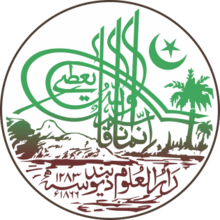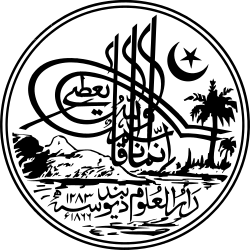Darul Uloom Deoband
The Darul Uloom Deoband is an Islamic university in India at which the Sunni Deobandi Islamic movement began. It is located in Deoband, a town in Saharanpur district, Uttar Pradesh. The school was founded in 1866 by Muhammad Qasim Nanautavi.
 | |
| Type | Islamic university |
|---|---|
| Established | 31 May 1866 |
| Founder | Muhammad Qasim Nanautavi |
| Chancellor | Majlis e Shura |
| Rector | Abul Qasim Nomani |
| Students | Approx 5000 |
| Location | , , |
| Campus | Deoband |
| Nickname | Darul Uloom |
| Website | www |

History
| Part of a series on |
| Deobandism |
|---|
 |
| Ideology and influences |
| Founders and key figures |
|
| Notable institutions |
| Centres (markaz) of Tablighi Jamaat |
| Associated organizations |
Darul Uloom Deoband was established on 31 May 1866 by Muhammad Qasim Nanotawi and other scholars in his circle. The founders include Aabid Hussain, Mehtab Ali and Nehal Ahmad (brother-in-law of Muhammad Qasim Nanautavi).[1]
In 1982, during the Vice Chancellorship of Muhammad Tayyib Qasmi, administrative disputes occurred in the seminary which led to the formation of Darul Uloom Waqf. [2][3]
The spread of the Deobandi movement in the United Kingdom has produced some criticism concerning their views on interfaith dialogue and values including democracy, secularism, and the rule of law. In September 2007 Andrew Norfolk of The Times published an article titled "Hardline takeover of British mosques" about the influence of the Deobandis whom the author called a "hardline islamic sect".[4]
In February 2008, an anti-terrorism conference organized by the seminary denounced all forms of terrorism.[5]
Program
The school teaches manqulat (revealed Islamic sciences) according to the Hanafi school of Islamic jurisprudence. In this seminar, Nanawtawi instituted modern methods of learning such as teaching in classrooms, a fixed and carefully selected curriculum, lectures by academics who were leaders in their fields, exam periods, merit prizes, and a publishing press. Students were taught in Urdu, and sometimes in Arabic for theological reasons or Persian, for cultural and literary reasons. The curriculum is based on a highly modified version of the 18th century Indo-Islamic syllabus known as Dars-e-Nizami. The students learn the Quran and its exegesis; Hadith and its commentary; and juristic rulings with textual and rational proofs. They also study the biography of Muhammad, Arabic grammar, Arabic language and literature, and Persian language.[6]
The syllabus consists of many stages. The five-year Nazirah (primary course) teaches Urdu, Persian, Hindi and English. The next level is the Hifze Quran. This involves the memorization of the Quran over two to four years. A few students will then choose Tajwid e Hafs (melodious recitation). The student is taught the detailed recitation rules of the Quran as laid down by Arbic Hafs. Still fewer will take up the next course, the Sab'ah and 'Asharah Qira'at (study of all the ten Quran recitations).
A post graduate studies equivalent is the Fazilat course taken over eight years. It commences with Arabi Awwal, in which the basics of the Arabic language is the main aim, and finishes with Daura e Hadith, in which the main books of the saying of the Holy Prophet are taught. A prerequisite for this course is completion of primary education. Memorization of the Quran is also recommended. Students who complete the Fazilat may use the title Alim or Maulvi. The Daurae Hadith (final year) class is taught in the basement of "an under construction seven storied building". In the 2017 - 2018 academic year (1438-1439 AH), 1664 students attended the Daurae Hadith class.
Almost a quarter of the students who complete the Daurae Hadith continue their studies. These advanced courses include Takmil Ifta (Jurisprudence); Takmil Adab (Arabic literature); and Takhassus fil Hadith (Hadith).[7] Students who complete the Takmil Ifta take the title Mufti.
Role in the Indian independence movement
The political ideals of Darul Uloom Deoband were founded up to ten years prior to its opening. In 1857 (1274 AH), Imdadullah Muhajir Makki (a spiritual leader) and his followers, Muhammad Qasim Nanautawio, Rasheed Ahmad Gangohi, Muhammad Yaqub Nanautawi and others gathered at Thana Bhawan to protest against British rule and continue their call for the independence of India.
In 1913 (1333 AH), Nanautavi's pupil, Mahmud al-Hasan was a leader in the independence movement. He incited revolution through a scheme which the Rowlatt committee called the Silken Letters. However, the scheme failed and al-Hasan and his followers were arrested and exiled. In 1920 (1338), al-Hasan was returned from exile in Malta. His group, Jamiat Ulama-e-Hind, which included Husain Ahmad Madani, Kifayatullah Dehlawi, Syed Fakhruddin Ahmad, and later on, Hifzur Rahman Seoharwi, Ateequr-Rahman Usmani, Minnatullah Rahmani, Habibur-Rahman Ludhyanvi, and Muhammad Miyan Deobandi joined with the Indian National Congress.
In 1926 and 1927 (1345 abs 1346 AH), graduates of the school called for Indian independence at Jami'atul-Ulama meetings in Calcutta and Peshawar. Madani opposed the suggestion of the All-India Muslim League for the partition of India along sectarian lines. He also advocated democratic government with religious freedoms and tolerance.[8][9][10]
On 29 December 1929, Majlis-e-Ahrar-ul-Islam (Majlis-e-Ah'rar-e-Islam,Urdu: مجلس احرارلأسلام, or Ahrar), a conservative Sunni Muslim Deobandi political party was founded in Lahore, Punjab. The founding members of the party were Chaudhry Afzal Haq, Syed Ata Ullah Shah Bukhari, Habib-ur-Rehman Ludhianvi, Mazhar Ali Azhar, Zafar Ali Khan and Dawood Ghaznavi.[11] The founding members were disillusioned by the Khilafat Movement, which had aligned with the Indian National Congress.[12] The party gathered support from the urban lower-middle class. It opposed Muhammad Ali Jinnah, leader of the All-India Muslim League and in the early years of Pakistan wanted Ahmadiyas to be declared non-Muslims.[13]
Fatwas
In January 2012, scholars from a Deobandi school issued a religious decision calling for the author Salman Rushdie to be barred from entering India to attend a literature festival because, in their opinion, he had offended Muslim sentiments.[14][15]
In May 2010, clerics from a Deobandi school issued a fatwa stating that men and women cannot work together in public offices unless the women are properly clothed.[16][17][18]
In September 2013, scholars from a Deobandi school issued a fatwa banning photography as un-Islamic.[19]
Alumni
Alumni include:
- Mahmud al-Hasan, leader of Silk Letter Movement
- Anwar Shah Kashmiri, hadith scholar
- Ashraf Ali Thanwi, Sufi Shaykh and author of Bahishti Zewar
- Muhammad Shafi Deobandi, first Grand Mufti of Pakistan
- Muhammad Ilyas Kandhlawi, founder of Tablighi Jamat
- Hussain Ahmed Madani, author of Composite Nationalism and Islam
Publications
Darul ‘Uloom Deoband and its alumni publish:
See also
References
- Syed Muhammad Miyan Deobandi, Ulama-e-Haqq Aur Unke Mujahidana Karname, Vol 1, Page 22-23
- https://www.researchgate.net/publication/237541853_2_Change_and_Stagnation_in_Islamic_Education_The_Dar_al-'Ulum_of_Deoband_after_the_Split_in_1982
- Bowering, Gerhard; Crone, Patricia; Mirza, Mahan; Kadi, Wadad; Zaman, Muhammad Qasim; Stewart, Devin J. (2013). The Princeton Encyclopedia of Islamic Political Thought. ISBN 978-0691134840.
- Norfolk, Andrew (7 September 2007). "Hardline takeover of British mosques". The Times. Retrieved 13 April 2019 – via www.thetimes.co.uk.
- "Muslim clerics declare terror "un-Islamic"" Times of India 25 February 2008.
- " Qawaide Dakhilah." Darululoom-deoband.com.
- "Regulations" Daraluloom Deoband.com
- Ghazzali A. Islamic Pakistan: Illusions and Reality." Ghazali.net
- Jaffrelot C. and Beaumont G. A History of Pakistan and Its Origins. p224. ISBN 1-84331-149-6.
- "Barelvi Islam." Globalsecurity.org
- Ahmad, N. Origins of Muslim consciousness in India: a world-system perspective. Greenwood Press, New York, 1991. p175.
- Jaffrelot C. A history of Pakistan and its origins. Anthem Press, 2004. ISBN 1-84331-149-6, ISBN 978-1-84331-149-2.
- Bahadur, Kalim (1998). "Dark Forebodings About President Tarar". Democracy in Pakistan: Crises and Conflicts. Delhi: Har Anand Publications. p. 176. ISBN 978-8-12410-083-7.
- "Darul Uloom Farangimahal fatwa Rushdie Jaipur visit. Siasat.com
- Cleric seeks apology from Rushdie. Kashmir monitor.org 19 January 2012.
- "Young Muslim women fume at Deoband diktat." Archived 23 August 2011 at the Wayback Machine News-views.India.
- "Deoband fatwa: It's illegal for women to work, support family." Times of India, 12 May 2010.
- "Insurance policy is un-Islamic: Deoband." Express India
- "Deoband issues fatwa banning photography as un-Islamic", Times of India, 11 September 2013.
- Ameeni K. (ed.) Al-Da'ee/Ad-Da'ee.
- Qaasmi H. (ed.) Maah Namah Darul ‘Uloom.
- 'Alwi K. (ed.) Aaeenah
External links
| Wikimedia Commons has media related to Darul Uloom Deoband. |
- Tabassum F. Deoband Ulema's Movement for the Freedom of India. Jamiat Ulama i-Hind, New Delhi, pdf at Attahawi blog, July 2007.
- Darul ‘Uloom Deoband, India, official website.
- Deobandi Islam Global security organisation website.
- Metcalf B. "Traditionalist" Islamic Activism: Deoband, Tablighis, and Talibs. Social Science Research Council, non-profit organisation, Brooklyn, New York.